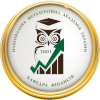educational and professional program "Accounting and Audit",
speciality: 071 - Accounting and taxation
Skills
the ability to solve complex tasks and problems in the professional activities field in accounting, analysis, control, audit, taxation or in the learning process, which involves research conducting and / or realization of innovation with uncertainty of conditions and requirements.
Description
Learning outcomes:
– to be able to develop and improve own general cultural and professional level, independently master new methods of work and knowledge about comprehensive vision of modern problems of economics and management;
– to know the theory, methods and practice of forming accounting information at the stages of the accounting process and control for current and potential management needs of business entities, taking into account professional judgment;
– to communicate in a foreign language orally and in writing on scientific issues to improve own professional and personal level;
– to be able to organize, develop, model accounting systems and coordinate the activities of accounting staff taking into account the needs of business entities management;
– to possess innovative technologies, justify the choice and explain the application of methods of preparation and provision of accounting information for the management needs of business entities;
– to determine the information needs of users of accounting information in the management of the enterprise and to provide advice to managerial staff of business entities on accounting information;
– to develop internal standards and forms of managerial and other reports of business entities;
– to substantiate the choice of the optimal system of taxation of the business entity activities based on current tax legislation;
– to form financial statements in accordance with national and international standards for business entities at the corporate level, disclose and use relevant information for managerial decisions making;
– to collect, evaluate and analyze financial and non-financial data to generate relevant information in order to managerial decisions making;
– to know the theoretical, methodological and practical provisions of the control process, to develop and evaluate the effectiveness of the control system of economic entities;
– to substantiate innovative approaches to information support of the system of control over the use of resource potential of economic entities and public sector institutions taking into account the business development strategy;
– to know international standards of quality control of audit, review, other assurance and related services in compliance with the requirements of professional ethics;
– to substantiate the choice and procedure for the application of management information technologies for accounting, analysis, audit and taxation in the system of managerial decisions making in order to optimize them;
– to apply scientific research methods in the field of accounting, audit, analysis, control and taxation and implement them in professional activities and business practice;
– to carry out public business and scientific communications for the solving of communicative problems by the state and foreign languages;
– to prepare and substantiate conclusions for advising owners, management of the business entity and other users of information in the field of accounting, analysis, control, audit, taxation;
– to identify current problems and to detect scientific facts in the field of theory, methodology, organization and practice of accounting, audit, analysis, control and taxation and to make scientifically-substantiated conclusions and to develop proposals for their solving;
– to adhere to the norms of professional and academic ethics, to use generally accepted norms of behavior and morals in interpersonal relations, professional and scientific activities and maintain balanced relations with team members, consumers, contractors, contact audiences;
– to be able to design, plan and carry out search and reconnaissance work, to perform their information, methodological, material, financial and personnel support;
– to understand the global problems of modern civilization and the impact of industry on the economic, environmental and social systems, principles, concepts and indicators of sustainable development of society, principles of life safety and occupational safety at the enterprise;
– to know the scientific foundations and principles of strategic analysis, its organizational, methodological, informational and resource support and to be able to distribute and optimize analytical work and apply its results in strategic management;
– to know the content and requirements for information support of the audit, computer technologies for information processing and their use in audit, be able to compose an audit algorithm and use special computer programs for control and testing.


